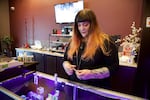At the Little Amsterdam Wellness Dispensary in Southwest Portland, store manager Monica Gayda said she's contacted all her vape product vendors to learn what's in their products — especially if they contain the additive Vitamin E acetate.

Monica Gayda said customers are moving to products that have few additives, like fresh frozen cartridges.
Kristian Foden-Vencil / OPB
“We’ve kind of put a halt on ordering flavored distillates as of now … Every single one of our vendors sent us a letter, calling out specifically the vitamin E [addtive], that they do not put in their cartridges. Test results included. I have them posted in our med room in case any customers want to see them,” Gayda said.
The number of Oregonians sickened by the mystery vaping illness has now climbed to eight. Two people have died. In Washington, seven have been sickened and Gov. Jay Inslee is planning a ban on flavored vape products. Oregon Gov. Kate Brown is also looking into a six-month ban of all vaping-related products.
Related: Oregon Governor Announces Temporary Ban On Flavored Vaping Products
Gayda said she's not seeing a big drop in sales because of this illness, but customers are choosing different products.
“I’m seeing a lot of people drop their flavored distillates for a healthier selection.”
She said people are still buying cartridges containing THC — that’s the psychoactive ingredient in cannabis. But they’re favoring products that don’t contain anything else. She calls them "fresh frozen" cartridges.
Related: Demystifying Cannabis Concentrates
“So fresh frozen is you hack the plant down right there. You freeze it, and then you steam distill it, or you turn it into a concentrate and it goes right into the cartridge. No additives, just plants,” Gayda said.
Additives are used for flavor or to change the viscosity of vaping liquid. If it’s too thick, for example, the vape pen can’t vaporize it efficiently.
Gayda said she has two friends who’ve vaped for years, and who were sufficiently rattled by this illness that they threw away their cartridges and went for chest x-rays. They were both fine.
She said she’s also had customers bring in black market products — to check. They had no labels and were bought with a credit card. Federal law doesn’t allow cannabis sales on credit cards, so that tells Gayda they were bought on the black market.
“If something doesn’t have a label on it, a test result, a date it was made — don’t buy it. … It doesn’t matter what price it is, if you think it’s the best deal of your life, it may be the worst decision of your life,” Gayda said.
Some black-market brands are now being linked to the illness, like Dank Vapes. The Centers for Disease Control and Prevention describes Dank Vapes as a class of largely counterfeit THC brands, with common packaging.
Related: Oregon DOJ Investigating JUUL While OHA Suggests Temporary Vaping Ban
The CDC has changed its messaging to further emphasize the role THC may be playing. CDC head Dr. Anne Schuchat outlined some of their research.
“On the national level, out of 514 patients with exposure histories, we found that 77% reported using THC-containing products, or using both THC-containing products and nicotine-containing products,” Schuchat said.
Only 16% of the patients said they’d used just nicotine. But Schuchat stressed, questions still remain and they don’t know what’s causing the illness – so they’re still recommending people not vape anything.

Paul Bates, the owner of Division Vapor, said he may well file a lawsuit if Oregon Gov. Kate Brown imposes a moratorium on vaping products. “It would depend on the nature of the laws and the nature of the bans.”
Kristian Foden-Vencil / OPB
That recommendation is dishonest, said Paul Bates, who owns Division Vapor in Southeast Portland.
He said it’s clear to him that the problem lies with people vaping THC, not nicotine.
“I certainly believe that they’re letting the misinformation stay in the minds of users. And that’s dangerous,” Bates said.
Related: Portland Research Shows Vaping Illness May Not Be New
He thinks health agencies have been looking to ban e-cigarettes for a long time, and that this illness has just given them the excuse they needed.
Bates said he may well also file a lawsuit if Brown imposes a moratorium.
“It would depend on the nature of the laws and the nature of the bans,” he said.
A lawsuit is no idle threat from Bates. He’s already battling Oregon in court over packaging rules.
He also believes prohibiting vaping won’t work — because it didn’t work with alcohol or cannabis.
Last week, the Oregon Health Authority gave Brown a list of six ways the state could prevent vaping problems. It included a six-month moratorium, an ad campaign and more tobacco-cessation efforts.
Brown's office issued a statement saying it’s getting feedback on those ideas and any decision will prioritize health.
The Washington State Board of Health will vote on its flavored e-cigarette ban on Oct. 9.
